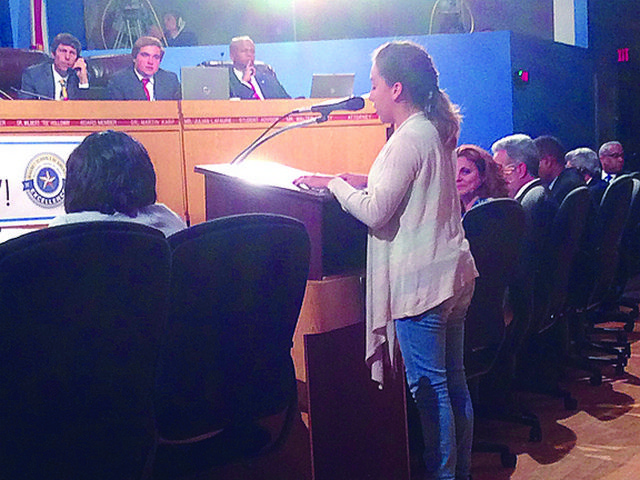
The pressure on students to do well on standardized tests, in addition to all of their other dayto- day school work and activities, can be overwhelming to them at times. Rosa Carvajal’s 7th Grade Legal Studies’ students at Norman S. Edelcup/Sunny Isles Beach K- 8 decided to tackle standardized testing as its topic in the “Project Citizen” competition. In Project Citizen, students work together to identify a public policy issue in their community and develop an action plan for local government leaders to use in addressing the matter. Among other things, the students interview community leaders and others as a part of the project and submit a portfolio containing their research and other information supporting their position. The students interviewed me, our School Board Representative, Dr. Martin Karp, the School’s Vice Principal, Alissa Tapia, as well as teachers and parents. The students won third-place in our School District and will be going to Tallahassee for the State final competition!
Our Legal Studies’ student and Project Citizen participant, Fiona Sheets, lobbied the Miami-Dade County School Board at its April 15, 2015, meeting on behalf of herself and the students. In attendance were Miss Sheets’ proud mother, aunt and sister, Ms. Carvajal and I. Miss Sheets acknowledged the new law adopted the day before the Board meeting and stated that the students were happy about the changes. However, the students asked the board to consider not giving standardized tests for elective classes. For example, students may choose to take a course in music but they spend so much time reviewing for a standardized test on “music theory” that they are not getting what they believe they bargained for— learning to play a musical instrument proficiently. The students are not against electives’ testing but feel that it should be done by their teachers.
After the School Board meeting, I spoke with Dr. Karp concerning the new law. He confirmed that the law will remain fluid as to those elements that are to be addressed by individual school districts. Iraida Mendez-Cartaya, Associate Superintendent of the Miami-Dade County Public Schools, Intergovernmental Affairs, Grants and Community Engagement, has summarized the changes in the law, and input for this article was also provided by Gisela Feild, Miami-Dade County Public Schools, Administrative Director, Assessment, Research, and Data Analysis.
Information was also contained in an April 23, 2015, Press Release issued by Miami-Dade County Public Schools. Some of the changes to, and resulting from, the law are the following:
• All standardized examinations will be conducted by the State so that there will no longer be any local examinations required in courses and subjects not tested by the State. What this means in part is that the State no longer requires local school districts to test elective courses but the districts may if they choose to do so. On April 23rd our District’s intent became clear on this issue, and our students’ wishes came true, at least for the current year when Alberto M. Carvalho, Miami-Dade County Schools Superintendent, announced that nearly all of the 300 Miami-Dade County District- Developed end-of-course (EOC) assessments that were originally scheduled for Spring 2015 were eliminated, and no elementary- level District-Developed EOC assessments will be given.
• Local school districts will no longer be permitted to give final EOC assessments in courses where the state already has an EOC for that course eliminating duplicate testing. According to Ms. Feild, our District never administered EOC’s already given by the State so there will be no change for our students.
• Ten middle/senior high school subjects will be included in a small-scale field test. The field test assessments are to ensure that state-established course content are being delivered consistently across our District and may also serve as a measure of student achievement in tested subjects to be used in teacher evaluation. However, the results from the field tests will not be used in 2014-15.
• There will be a gradual rollout so that eventually all standardized examinations in Florida will be taken using computers.
• The amount of time that students may spend taking standardized tests has been limited to no more than 5% of total school hours per student, per year. It is unclear if the 5% includes test preparation, however, 5% is approximately 45 hours according to the State. It should be noted though that testing may take more than 5% of school hours in certain circumstances such as where a student elects to take an exam for an accelerated program.
• The state must provide test results to the student and parents by the end of the school year, and local test results must be provided within 30 days of the date of the test.
• The requirement for progress monitoring, a scientifically based practice used to assess academic performance and evaluate teachers, has been eliminated, but teachers must be provided with test results and benchmarks to aide in the improvement of instruction. Further, where test results are utilized to evaluate teachers, the weight given to teacher evaluation is reduced from 50% to 33%.
• Testing shall provide for identification of students at risk of failing and programs for intervention shall be instituted.
• The requirement for 11th grade English Language Arts assessment has been eliminated.
• The requirement for intensive remedial courses for secondary students has been eliminated.
If you have any questions or want more information, please contact your school’s administrative offices.






